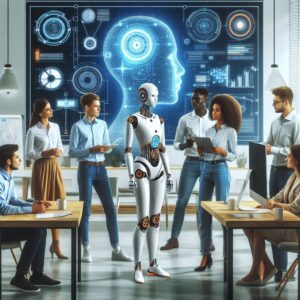Imagine a world where marketing strategies are crafted, executed, and optimised without human intervention. This might sound like a scene from a sci-fi movie, but with the rapid advancements in artificial intelligence (AI), it’s becoming a plausible reality.
The future of marketing without humans hinges on the capabilities of AI , which is already transforming how businesses engage with their audiences. While AI can handle data analysis, content creation, and customer interactions, the human touch remains irreplaceable in understanding nuanced consumer behaviours and emotions. So, while AI will undoubtedly play a significant role, the future of marketing will likely be a harmonious blend of human creativity and efficiency.
Key Takeaways
- AI in marketing is revolutionising customer engagement by automating tasks and providing data-driven insights.
- The transition from traditional marketing to AI-driven strategies involves several stages, including data collection, analysis, and automation.
- Despite AI’s capabilities, human creativity and emotional intelligence remain crucial in crafting effective marketing strategies.
The Rise of AI in Marketing
AI in marketing is not just a buzzword; it’s a transformative force reshaping the industry. From personalised content recommendations to automated customer service, AI is enhancing the way businesses connect with their audiences. By leveraging machine learning algorithms, companies can analyse vast amounts of data to gain insights into consumer behaviour, preferences, and trends. This data-driven approach allows marketers to create highly targeted campaigns that resonate with their audience.
One of the most significant advantages of AI in Marketing is its ability to automate repetitive tasks. This frees up valuable time for marketers to focus on strategic planning and creative thinking. For instance, AI-powered tools can handle email marketing, social media scheduling, and even content creation, ensuring consistency and efficiency across all channels.
However, the integration of AI in marketing is not without its challenges. Businesses must navigate issues such as data privacy, algorithm bias, and the need for continuous learning and adaptation. Despite these hurdles, the potential benefits far outweigh the risks, making it an essential component of any modern marketing strategy.
Transitioning from Traditional to AI-Driven Marketing
The journey from traditional marketing to AI-driven strategies is a gradual process that involves several key stages. Initially, businesses must focus on data collection and management. This involves gathering information from various sources, such as customer interactions, social media, and website analytics. Once the data is collected, AI algorithms can analyse it to identify patterns and trends.
The next step is to implement tools that can automate and optimise marketing efforts. For example, AI can be used to segment audiences, personalise content, and predict customer behaviour. By leveraging these capabilities, businesses can create more effective marketing campaigns that drive engagement and conversions.
As technology continues to evolve, the possibilities for marketing automation are endless. From chatbots that provide instant customer support to AI-generated content that resonates with audiences, the future of marketing is undoubtedly exciting. However, it’s important to remember that AI is a tool, not a replacement for human creativity and intuition.
The Role of Humans in an AI-Driven Marketing World
While AI offers numerous benefits, the human element remains crucial in marketing. AI can analyse data and automate tasks, but it lacks the emotional intelligence and creativity that humans bring to the table. Understanding consumer emotions, motivations, and cultural nuances requires a human touch that AI cannot replicate.
Moreover, human marketers play a vital role in setting the strategic direction and ensuring that AI tools align with the company’s goals and values. They are responsible for interpreting AI-generated insights and making informed decisions that drive business growth. In this sense, AI serves as an enabler, empowering marketers to work smarter and more efficiently.

As we move towards a future where AI plays a more prominent role in marketing, it’s essential to strike a balance between automation and human creativity. By combining the strengths of both, businesses can create compelling marketing strategies that resonate with their audience and drive long-term success.
Revolutionising Customer Engagement
One of the most significant impacts is its ability to revolutionise customer engagement. By leveraging AI technologies, businesses can deliver personalised experiences that resonate with their audience. For instance, AI can analyse customer data to provide tailored product recommendations, personalised content, and targeted advertisements.
AI-powered chatbots are another example of how AI is transforming customer engagement. These virtual assistants can handle customer inquiries, provide support, and even process transactions, all without human intervention. This not only improves the customer experience but also allows businesses to operate more efficiently.
For more insights on how AI is transforming customer engagement, check out our article on: revolutionising customer engagement. By embracing AI technologies, businesses can create meaningful connections with their audience and drive long-term loyalty.
Conclusion: Embracing the Future of Marketing
The future of marketing without humans is not about replacing human creativity and intuition but rather enhancing it with AI capabilities. As AI continues to evolve, it will play an increasingly important role in shaping marketing strategies and driving business growth. However, the human element remains irreplaceable in understanding consumer emotions and crafting compelling narratives.
As we embrace this new era of marketing, it’s essential to strike a balance between AI automation and human creativity. By leveraging the strengths of both, businesses can create innovative marketing strategies that resonate with their audience and drive long-term success. For more insights on the benefits of, explore our article on the Benefits of Using AI in Marketing Campaigns.
At weknowthingsmarketing.com and at our partner Inovient.io, we are committed to helping businesses navigate the ever-changing marketing landscape. Whether you’re looking to integrate AI into your marketing strategy or enhance your existing efforts, our team of experts is here to support you every step of the way. Contact us today to learn more about how we can help you achieve your marketing goals.
FAQ Section
What are the potential risks of using AI in marketing?
While AI offers numerous benefits, it also comes with potential risks such as data privacy concerns, algorithm bias, and the need for continuous learning and adaptation. Businesses must address these challenges to ensure the ethical and effective use of AI in marketing.
How can businesses ensure a successful transition to AI-driven marketing?
To ensure a successful transition, businesses should focus on data collection and management, implement AI tools that align with their goals, and continuously monitor and optimise their marketing efforts. It’s also essential to strike a balance between AI automation and human creativity.
What role do humans play in an AI-driven marketing world?
Humans play a crucial role in setting the strategic direction, interpreting AI-generated insights, and ensuring that AI tools align with the company’s goals and values. They bring emotional intelligence and creativity to the table, which are essential for crafting effective marketing strategies.
How is AI revolutionising customer engagement?
AI is revolutionising customer engagement by delivering personalised experiences, providing tailored product recommendations, and offering instant customer support through AI-powered chatbots. These technologies enhance the customer experience and drive long-term loyalty.
What are the benefits of using AI in marketing campaigns?
It offers numerous benefits, including improved efficiency, enhanced personalisation, and data-driven insights. By leveraging AI technologies, businesses can create more effective marketing strategies that resonate with their audience and drive business growth.



